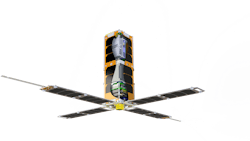D-Orbit deploys USC's La Jument system cubesat to prove-out space artificial intelligence (AI) technologies
FINO MORNASCO, Italy - Space logistics and orbital transportation company D-Orbit announced the successful deployment of Dodona, a 3U CubeSat developed by the University of Southern California (USC), in collaboration with Lockheed Martin. The satellite was launched in January 2022, as part of D-Orbit’s DASHING THROUGH THE STARS mission.
Dodona carries Lockheed Martin’s software-defined La Jument payload which will help space qualify a number of artificial intelligence (AI) and machine learning (ML) technologies. On orbit, the La Jument payload will demonstrate how Lockheed Martin’s SmartSat software-defined satellite architecture can control a low-cost camera and perform onboard SuperRes upscale processing of collected image data of the Earth’s surface. SmartSat allows users to expand satellite capabilities and change missions on orbit.
The system is powered by the NVIDIA Jetson platform built on the CUDA-X capable software stack and supported by the NVIDIA JetPack software development kit (SDK), delivering AI at the edge computing capabilities for advanced image and digital signal processing.
For the launch and deployment, D-Orbit relied on its ION Satellite Carrier, the Company’s proprietary orbital transportation vehicle able to transport a batch of satellites into space and release them individually into precise orbital slots, customizing altitude, ascending node, and performing True Anomaly Phasing to reduce time from launch to full operativity for satellite constellations up to 85%. The DASHING THROUGH THE STARS mission is D-Orbit’s fourth orbital transportation mission in less than 15 months.
After the conclusion of the deployment phase, ION will enter the in-orbit validation phase of the mission, during which the company will conduct in-orbit testing of the technology of the third-party payloads and run a second iteration of its own cloud platform.

